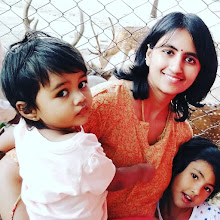Learning Maths Naturally
Counting and Reverse Counting
Counting while Sticking
Numbers Tracing
Making Numbers
Counting and Fractions
Roll and Clap
She also understands that a number is something that is used to depict the quantity of objects. I introduced numbers starting from 0 which actually means that there is nothing.
That's all about it.
But, in our conversations, I observe that she adds, subtracts, multiplies and divides - all in her mind without actually knowing these terms - addition, subtraction, multiplication and division.
When I quite understood that she was adding some numbers and telling me the sum total of them, I used to try popping the term addition in my sentences, but, a little into it, I stopped using any of these terms (addition/subtraction/multiplication) and was keen in observing how she would actually use her ability and describe me what she just calculated in mind.
Some examples where I observe her doing Maths are:
She just had a biscuit and takes two more by saying, she is interested in having 3 biscuits out of which 1 is already in her mouth and 2 yet to be eaten.
She pours in the idli batter so precisely while counting the number of idlis for each member of the family.
She, quite frequently, keeps counting the members of the family who are at home and who are outside home at the moment.
She counts the GEMS that she has eaten and the ones remaining and says the total number of GEMS that were there.
She buys a Rs 10 MilkyBar and Rs 20 MilkyBar in two separate instances and says, with Rs 20, you could get two Rs 10 MilkyBar. She differentiates the Rs. 10 Bar from Rs. 20 one based on their sizes. (So, did she know 10+10 = 20, 10*2 = 20, 20/2 = 10)
She shows how much is half of full on the cup she uses to drink milk.
She knows what a half dosa/chapathi means.
She knows the difference between G and B2 levels is one floor.
She might not comprehend the terms addition, subtraction, multiplication, division yet, but she can understand the operations that they are supposed to be meant for.
During pretend play, she counts the number of toys that have have left for school, number remaining at home and says total number of toys.
and many more everyday instances where she uses numbers and adds/subtracts/multiplies/divides.
Children naturally keep assimilating all the knowledge around them with absolutely no teaching required. Children are born as self-directed learners until there is an external force trying to manipulate them or instruct them more than what they can take in at the moment. Once there is force, there is pain.
For children, living is learning, playing is learning, every moment is learning. We cannot separate learning from living/playing.
Edit(20/11/2017)
DD2 was keenly observing DD1 using some sparkler this evening, upon getting a chance to try her hand at it, she tried to hold it in a similar fashion of how we hold a pen and tried writing with it on a paper. As I and DD1 were watching, I said, that glitter is empty now, we shall buy more glitter some time soon. To which DD1 replied: let's buy many many glitters so that I can do something with them.
Me: So, you should also be giving them to your sister, right?
DD1: Let's buy 5 colours, out of which I will give 1 to sister
Me: What if your sister also wants to use all of them and she would ask for the ones you have?
DD1 (quite instantly) : OK, Let's buy total 10 glitters out of which there are 5 colours so that me and sister will have the same colour set of glitters.
DD1 knew 5 + 5 = 10 (without counting with fingers, it was intuitive), and, that 5 * 2(same colours) = 10 (again, intuitive)
The same child, in her first standard, will be taught addition in school in a way where they count their fingers and keep adding numbers. I wonder if school will actually replace this intuitive learning with instructions-based learning? Learning, as I understand, is very specific to the individual. It depends on the mental frame of the learner that in turn depends on lot many parameters that are very very specific to any individual. Is the child's unique ability really justified in school?
Labels: naturalLearning


0 Comments:
Post a Comment
Subscribe to Post Comments [Atom]
<< Home